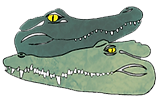The Wildlife Management Program works towards the protection, conservation and sustainable use of wildlife resources in Belize. The program promotes and ensures compliance with the Wildlife Protection Act (CAP220) to ensure sustainable use of forest and wildlife resources.
The Wildlife Protection Act (CAP 220) defines “wildlife” as all undomesticated mammals, birds, and reptiles, including body parts, eggs, and nests of any of these wildlife forms. The Forest Act lends support to the WPA on the protection of wildlife.
Responsibilities:
- Biodiversity monitoring – one important aspect of wildlife management is the monitoring of wildlife species. The Forest Department monitors predators such as the jaguar (Panthera onca) and puma (Puma concolor) in conflict areas as part of human-wildlife conflict program. Monitoring helps us determine the specific “problem animal” and also the best actions that can be taken to address the conflict.
- Human-Wildlife Conflicts: People and wildlife sometimes come in close contact and wildlife can cause problems in our homes, communities and farms. The Forest Department works with affected persons to promote co-existence with our wild neighbours.
- Enforcement of the Wildlife Protection Act –The wildlife management program engages in patrols, and checkpoints to deter the unsustainable use of wildlife species. As part of this activity, the wildlife program meets with other enforcement officers for information sharing on wildlife crime and trafficking. Since game meat is consumed in Belize, its harvesting and sale is legalized through licenses. As a result, the Forest Department carries out restaurant checks whilst at the same time, educating restaurant owners on hunting and dealer provisions.
- Public Outreach – The Forest Department visits schools and communities to educate them about Belize’s wildlife, its importance and co-existence. Large national events are targeted in an effort to reach a wider audience to educate them about the amazing wildlife we have in Belize.
- Rescues – The Forest Department and its rehabilitation partners often receive reports of injured or orphaned wildlife. Wildlife which are successfully rescued are transported to rehabilitation centers for rehabilitation and reintroduction to the wild.
- Inspections of Captive Wildlife including parrots – Parrots among the wildlife species that are highly sought for pets in Belize. Even though this act is illegal, the Forest Department has permitted a few wildlife species to be held in captivity as pets. The Forest Department has a specific protocol in place to determine if a parrot can be legally kept. If you have a pet parrot and it is not registered with the Forest Department, please contact any of our offices for guidance on the process.
• Compliance monitoring – In enforcing the Wildlife Protection Act, the Forest Department carries out investigations on illegally kept wildlife. Law infringements lead to the confiscation of wildlife. In the case of live wildlife, those are rehabilitated and introduced back into the wild.
Injured/Orphaned Wildlife
What to do?
As of 2023, avian influenza (H5N1) has been detected in the American region. The disease is a global threat to animal health, food security and livelihoods.
Wildlife partners
The Forest Department works closely with wildlife rehabilitation centers throughout the country. These centers offer veterinary and rehabilitation services for rescued and confiscated wildlife. Our Wildlife Partners are:
ACES Wildlife Rescue

Animal Medical Center

Belize Bird Rescue

Belize Raptor Center

Belize Wildlife and Referral Clinic

Animal Medical Center

The Belize Zoo


